House prices beginning to turn in Greece!
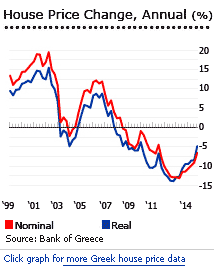 House prices are now falling at a much slower pace in Greece, compared to the sharp price drops of 2012 and 2013. Greek house-prices declined over the year, but during the latest quarter house prices actually rose in some locations (when prices are adjusted for inflation), such as in Thessaloniki.
House prices are now falling at a much slower pace in Greece, compared to the sharp price drops of 2012 and 2013. Greek house-prices declined over the year, but during the latest quarter house prices actually rose in some locations (when prices are adjusted for inflation), such as in Thessaloniki.
- In Athens, the average price of apartments fell by 6.65% (-4.90% in real terms) during the year to Q4 2014, according to the Bank of Greece. Compared to the previous quarter, house prices in Athens dropped by 1.46% (-0.78% in real terms) in Q4 2014.
- In Thessaloniki, the country’s second largest city, house prices fell by 6.89% (-5.15% in real terms) y-o-y to Q4 2014. From the previous quarter, house prices were almost the same, slightly declining by only 0.33%. When adjusted for inflation, house prices actually rose by 0.35% from the previous quarter.
- In other cities (excluding Athens and Thessaloniki), there was a 5.86% drop in house prices (-4.10% in real terms) during the year to Q4 2014. During the latest quarter house prices fell by 1.94% (-1.26% in real terms) in Q4 2014.
- In other urban areas (excluding Athens), residential property prices declined by 1.80% (-0.38% in real terms) y-o-y in Q2 2014. Quarter-on-quarter nominal house prices slightly rose by 0.39%, although they actually fell by 0.87% when adjusted for inflation in Q2 2014.
Alpha Bank A.E.’s Theodoros Kalantonis is optimistic that home lending will revive soon, saying this year will be a turning point for the Greek mortgage market as buyers realize that prices won’t decline any further.
Despite green shoots, activity is amazingly depressed: Residential property appraisals-transactions were 33.20% down on the previous year in 2014; dwelling permits fell 19.3% from January to November 2014 compared to the same period in 2013; total new floor space, measured in square metres, was down by 13.9% y-o-y as of November 2014 - large falls in an already cataclysmically depressed housing market (see below).
To revive the housing market, the Greek government recently offered residence to non-EU investors purchasing or renting property worth over €250,000. The residence plan, which is similar to measures adopted by Hungary, Spain and Portugal, is valid for five years and open to renewal.
The Greek Finance Ministry also announced last December that a capital gains tax on property, originally scheduled for introduction in summer of 2014, will be pushed back to December 31, 2016.
Tracking the decline
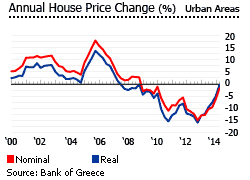
There was a surge in house prices after the 2004 Athens Olympics. with increased demand for second homes and holiday villas, especially in Greece’s southernmost and biggest island, Crete. Real estate agents reported 30% to 40% annual price rises for properties near the sea. The boom was also facilitated by improvements in local infrastructure and building quality.
But then the crisis hit and in 2009, the average house price dropped by around 1.8%. In Athens, house prices rose 8.7% in 2005 and 11.2% in 2006, before slowing to 6.2 in 2007.
Residential property prices have been falling in Athens since 2008:
- In 2008, house prices in Athens fell by 0.77% (-3.59% in real terms)
- In 2009, house prices fell by 4.21% (-5.99% in real terms)
- In 2010, house prices fell by 5.83% (-10.45% in real terms)
- In 2011, house prices fell by 7.97% (-10.43% in real terms)
- In 2012, house prices plunged by 12.94% (-13.92% in real terms)
- In 2013, house prices plunged by 11.45% (-9.48% in real terms)
- In 2014, house prices fell by 6.65% (-4.90% in real terms).
Mountain of debt, mounting misery
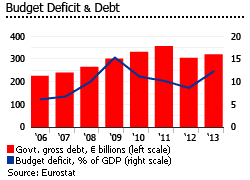
Greece’s debt problem is deeply rooted and, unfortunately, there is no easy way out. When the euro was first introduced in 1999, Greece was left out because of its high budget deficit and inflation. Embarrassed by the isolation, Greece appeared to clean up its act and fix its finances and macroeconomic fundamentals. By January 2001, it was able to adopt the euro as official currency.
In November 2004, however, Greece admitted that it had fudged its figures to gain entry into the Eurozone. Its budget deficit had never been within the EU limit of 3% of GDP since 1999. It was also revealed in early 2010 that Greece had paid Goldman Sachs and other banks to hide the true amount of its debt and borrowing.
Euro adoption by Greece led to a cycle of debt-financed growth and deficit-spending. Access to cheap funds allowed it to continually pump-prime the economy, leading to higher growth.
With higher growth, government officials found it right to reward themselves with higher incomes and pensions and generous leave credits and bonuses. The bureaucracy is also bloated and overstaffed.
The increase in spending pushed the national debt from €225.3 billion in 2006, to €317.7 billion in 2014, a 41.7% increase. In terms of percentage share of GDP, national debt went up from 103.4% of GDP in 2006 to 176.3% of GDP in 2014. The national debt is predicted to slightly decline to 170.2% in 2015.
You gotta cut, cut, cut!
When it was clear that the spending spree was unsustainable, creditors and the EU together with other international institutions such as the IMF demanded that Greece cut its spending, including wages and pensions. This was met with severe public resistance, manifested in public protests and rioting.
One of the biggest casualties of the crisis was the ruling government. Seeking a fresh mandate to deal with the crisis, the New Democracy Party called for a snap election two years earlier than required, and was soundly defeated by the Pan-Hellenic Socialist Movement (PASOK) headed by George Papandreou, who then became prime minister.
After assuming office in October 2009, Papandreou revealed that the deficit was much higher than the previous government had claimed. His response included austerity measures: spending cuts and tax increases. He also vowed to downsize the public sector and fight rampant tax evasion. In May 2010, European leaders and the International Monetary Fund (IMF) agreed to a three-year, €110 billion bailout for Greece which was tied to additional austerity measures through cuts in the public spending (civil servants´ salaries, freezing pensions, raising the retirement age) and hikes in taxes and fuel duty. The general sales tax was raised from 19% to 21%. These moves lead to a 4% economic contraction in 2010.
Violent protests, rallies, and strikes followed.
The EU offered another bailout loan worth €130 billion in February 2012, saving the country from leaving the Euro. The bailout loan, however, included as condition that Greece should approve a further austerity package.
The continued demand for cuts and more cuts in the face of already-high levels of public misery led to the rise of the radical leftist party Syriza, a coalition of diverse elements. Its leader, Alexis Tsipras, led Syriza to victory when the government´s majority collapsed and assumed office on January 26, 2015.
Maybe we´ll just go, go, go
There followed intense negotiations in Europe. The Greek government secured a four-month bailout extension, which the German parliament approved on February 27, 2015, despite Tsipras having earlier pledged “No more bailouts, no more submission, no more blackmailing." Tsipras is meanwhile under pressure to start negotiations for a third bailout program that is expected to commence in July 2015.
Syriza is angling for an EU-wide recognition that austerity has failed as an economic strategy, rather than asking for mere debt relief. But since Germany appears immovable, it still remains possible that Greece will exit the Euro - which judging from Argentina´s 2002 de-peg from the US$ could be a viable solution. It would mean temporary chaos in Europe, ironically especially for German banks heavily exposed to Greek debt.
Based on the bailout program audit reports released by the IMF and the European Commission in June 2014, Greece has a forecast financing gap of €5.6 billion in 2014, €12.3 billion in 2015, and €0 billion in 2016.
Mortgage market a shadow of its former self
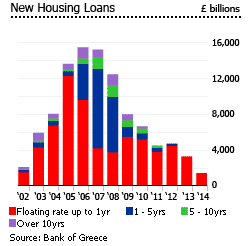
New housing loans fell to €1.4 billion in 2014, from €3.3 billion in 2013, and €15.4 billion in 2006 - i.e., the new loans market has virtually collapsed.
By end of 2014, outstanding housing loans in Greece reached 38.16% of GDP or €69.4 billion, only a 2.3% decline from the previous year, but this glorious total is an illusion, reflecting the fact that many house-owners cannot repay.
The housing loan market grew by an average 30% annually from 2001 to 2007, expanding from 10.7% of GDP in 2001, to 31.1% of GDP in 2007. Though the credit crunch slowed the expansion to 4% in 2009, by the end of that year outstanding housing loans had reached €80.56 billion, around 34% of GDP, and only began to decline after 2010.
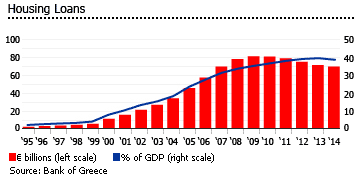
Starting January 2015, around 120,000 homeowners who were unable to meet their mortgage payments are likely to face foreclosure, as the law protecting foreclosure of primary homes expired at the end of 2014.
The “Katselis Law”, which was enacted in 2010, was intended to freeze foreclosures on houses with outstanding mortgage debt worth up to €200,000, given that the family’s annual income is lower than €35,000. These homeowners should also pay at least 10% of their net monthly income towards their mortgage.
There were no plans to extend the program due to the pressure that the Greek government received from its international creditors. However, the government assured homeowners that those with houses worth less than €300,000 will not be at risk as long as they cite certain clauses of the law, stipulating that those debtors with difficulties have the right to come to a settlement with the banks, factoring in their income and extending their payment period.
Mortgage interest rates are low
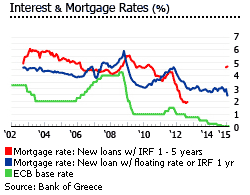
Mortgage rates in Greece started declining from mid-2011, and are now low:
- Mortgage rates for new loans with initial rate fixation (IRF) of up to one year fell to 2.44% in January 2015, from 2.70% in January 2014.
- Average mortgage rates for outstanding housing loans with IRF of between 1 and 5 years declined to 3.90% in January 2015, from 4.29%.
- Average mortgage rates for outstanding housing loans with IRF of over 5 years, declined to 2.84% in January 2015, from 3.02%.
The Greek housing market is vulnerable to interest rate movements as the majority of housing loans have IRF of up to one year only. Since 2H 2009, 70% or more of new housing loans have had interest rates adjustable at least annually.
Rental yields are improving, albeit poor
Gross rental yields in Greece remain poor. However, yields have improved as compared to previous years.
Rental yields for apartments in central Athens range from 3.45% to 4.57%, with smaller apartments having higher yields, based on the Global Property Guide research of late 2014. The average rental yield in central Athens, which was around 3.95%, was an improvement from 3.15% in 2013, 3.05% in 2012, and 2.66% in 2011.
Apartments within the suburbs of Athens have higher yields ranging from 3.46% to 4.61%. However, houses in the suburbs have lower yields ranging from 2.76% to 2.79%.
In Crete, gross rental yields of apartments range from 3.01% to 5.19%. As in Athens, smaller apartments tend to earn higher yields.
Around three fourths of the Greeks are homeowners. The homeownership rate in Greece was relatively high at 75.9% in 2012, according to the European Mortgage Federation (EMF). The rental market comprised 20% of the dwelling stock in 2004, down from 24% in 1991.
Rapid urbanization has led to a sharp dichotomy between urban and rural areas. A report in 2001 revealed that around 34% of the housing stock is vacant, mostly in rural areas. These units are typically dilapidated, or in need of total rehabilitation.
On the other hand, dwellings units in urban areas are among the most crowded in Europe. Most children continue to live with their parents after they enter adulthood. The reduction of notary fees from 1.2% to 1% of the real estate’s value was clearly insufficient in reducing the high transaction cost, which adds to the burdens of first-time homebuyers.
Low construction activity
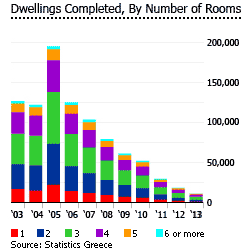
Construction activity in Greece peaked in 2005, a year after the Athens Olympics. Almost 200,000 dwellings were completed in 2005. By 2013, the number of dwellings completed had fallen 94% to 11,748 units - and the numbers continue to fall. Total housing completions were down 19.2% from January to November 2014 from the same period last year.
From January to November 2014, the number of building permits was around 12,199, down by 19.3% from the same period in 2013 - a striking contrast from the 70,000 to 80,000 permits issued annually from in 2004 to 2007.
Real estate sales dropped from 117,900 in 2010, to 45,000 in 2013, according to the Hellenic Statistical Authority (El. Stat.).
Despite these massive declines, there remains an "excess" of housing supply, judging by the large stock of unsold property. An article by the Greek newspaper Neos Kosmos in April 2014, stated that the number of dwellings available for sale is hard to estimate, but may have gone beyond 200,000 units due to homeowners and construction companies seeking liquidity and wishing reduce their tax burden.
According to the European Mortgage Federation (EMF), the excess in supply is attributed to the considerable drop in demand due to “a surge in unemployment, a fall in households’ disposable income, real estate tax hikes and an unstable – at least until recently – tax regime, coupled with liquidity shortage against the backdrop of banks’ tightened credit standards”.
Recession is over, better growth outlook in 2015
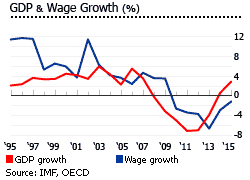
After six years of depression, Greece has bounced back to growth with GDP rising by 0.6% in 2014. Before this, the country’s real GDP had contracted by 3.8% in 2013, almost 7% in 2012, 7.10% in 2011, 4.9% in 2010, 3.1% in 2009 and 0.2% in 2008, according to the IMF. During the 4th quarter of 2014, GDP fell by 0.4% as compared to the previous quarter, but is still 1.3% higher than the previous year.
2014’s GDP growth, although meagre, suggests that Greece is likely to be a happier place in coming years. In 2015, Greece´s GDP growth is forecast at around 2.9%, followed by 3.7% growth in 2016. According to the Bank of Greece, it is likely that the economy will return to a steady growth path in coming years.
The central bank warns, however that the political uncertainty in the country, in relation to the recent elections, might cause a negative spillover. According to Bank of Greece Governor Yannis Stournaras, political uncertainty was already affecting local markets. “There is a risk that the growth that has only just started to resume may be halted, but there is also a large risk of irreversible damage being done to the Greek economy,” said Stournaras.
In 2014, Greece was able to sustain a primary budget surplus of around €1.9 billion, although it fell short of the government´s €4.9 billion target. This was an improvement from the €691 million budget surplus recorded in 2013, the first primary budget surplus in a decade, and the €3.46 billion deficit in 2012. In 2015, Greece is aiming to attain a primary budget surplus of around 2.9% of GDP, slightly down from the bailout deal’s 3% target.
The country’s budget deficit is expected to decline to just 0.2% of GDP in 2015, down from the 1.3% of GDP in 2014. The country’s overall budget deficit stood at 2.2% of GDP in 2013, far lower than the budget deficits of 6% of GDP in 2012, 9.5% in 2011, 10.5% in 2010 and 15.8% in 2009.
Greece’s national debt reached 176.3% of GDP in 2014, slightly higher than the 174.9% of GDP in 2013 and 156.9% of GDP in 2012. National debt is expected to fall to around 170.2% of GDP in 2015.
Consumer prices in Greece are still declining, with prices falling 2.2% during the year to February 2015. This price drop was actually slower as compared to the 2.8% annual deflation in January 2015 and 2.6% in December 2014, based on the figures from the Hellenic Statistical Authority (El. Stat.).
Unemployment was 26% in December 2014, slightly lower than the 27.3% rate in December 2013, according to El. Stat.